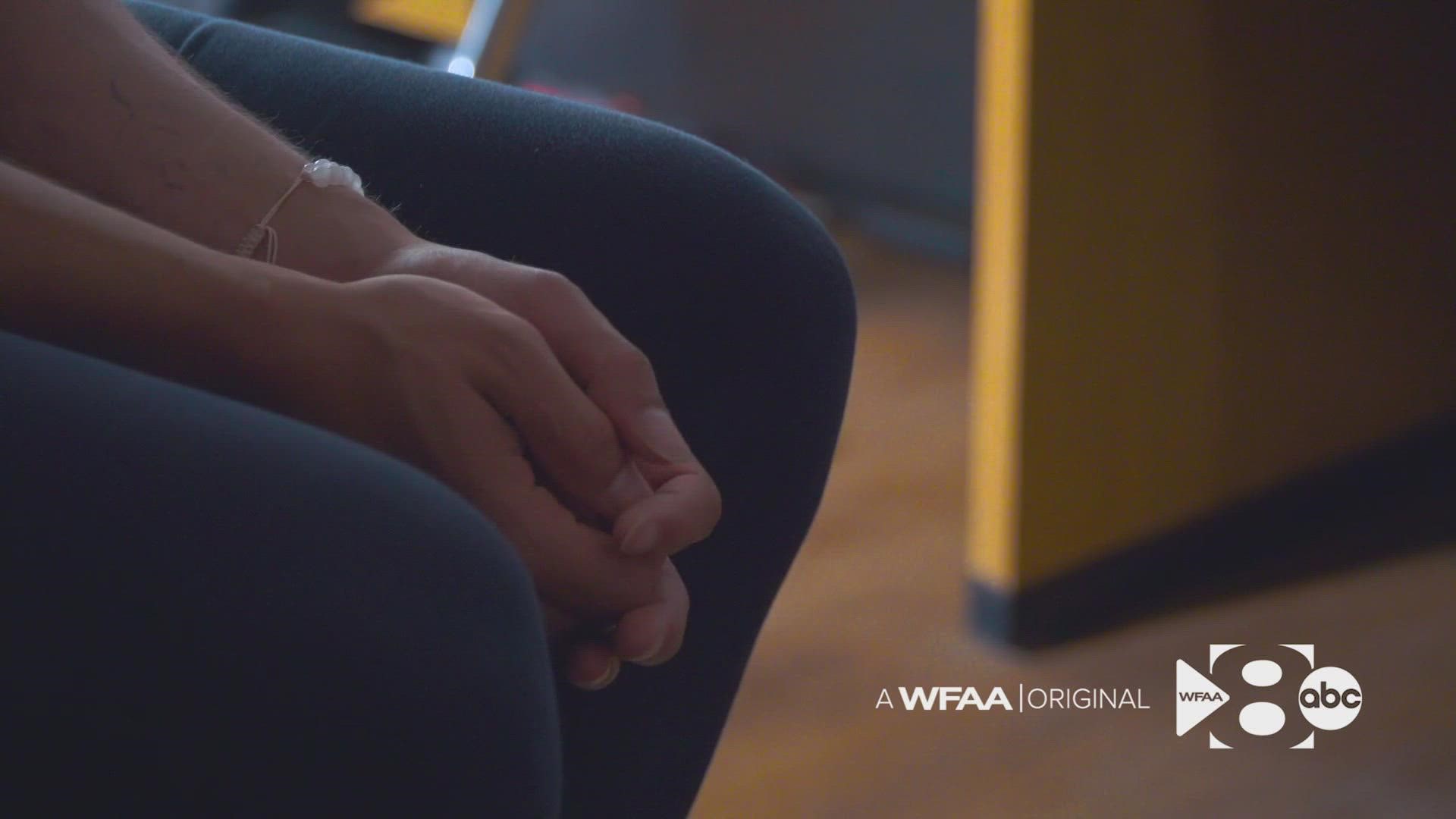It happens to boys, too: A look inside the North Texas safe house for male sex trafficking victims, the first in the country
Male sex trafficking victims are often mislabeled as sexually promiscuous, but like female victims, the crime is often hidden within the world of prostitution.
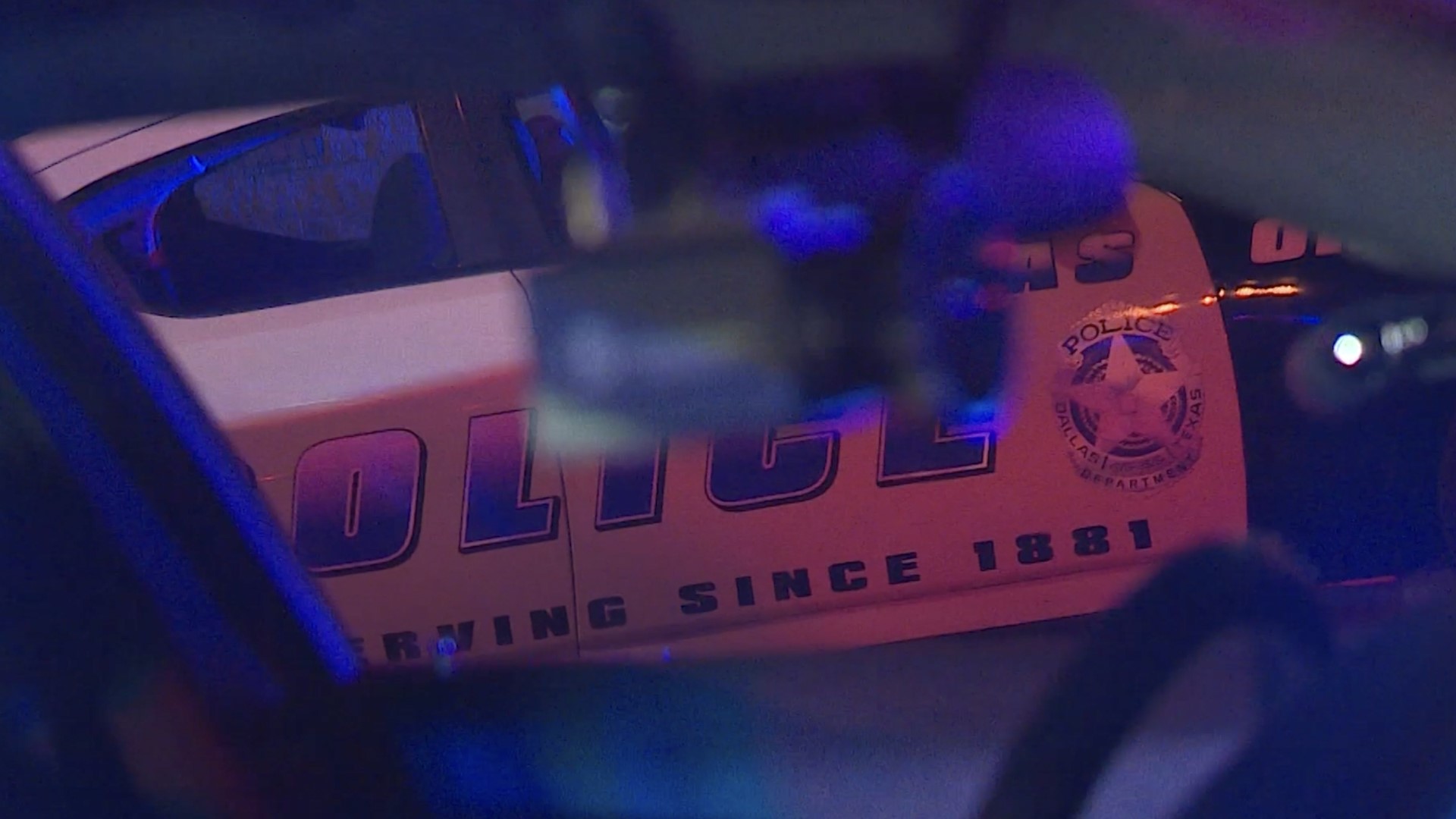
Chapter 1 'There are others'
"It happens more than often."
He's sitting on a stool, tapping his fingers on his knee. He's asked not to be identified, but he wants to tell his story.
He's 27 and has been living at Bob's House of Hope for a few months.
“It really allows you to step back and see that you’re not just in the same position," he said. "There are others."
Other people like him. Other male victims of sex trafficking.
After a few deep breaths, he starts to tremble. He decides he's not ready to share the details. It's too soon. It's too much.
He apologizes, takes off his microphone and slides off the stool.
"The kind of trauma reaction that you’re seeing is the product of repeated abuse," Landon Dickeson, executive director of Bob's House of Hope, said.
Dickeson said the man was trafficked in multiple states for years.
His time at the house has been focused on addressing and healing his trauma and reclaiming his life from the hands of abuse, manipulation and addiction.
It's the work Bob's House of Hope was created to do when Bob Williams, a survivor of sexual assault himself, opened the house in the summer of 2021.
"We were full in the first week," Williams said. "Then, the calls started coming...The number of calls we get is overwhelming from law enforcement and other agencies."
Williams said it's the first safe house for male sex trafficking victims in the country, and it's nestled in a secret location in Denton.
Chapter 2 Rand Hands Rescue

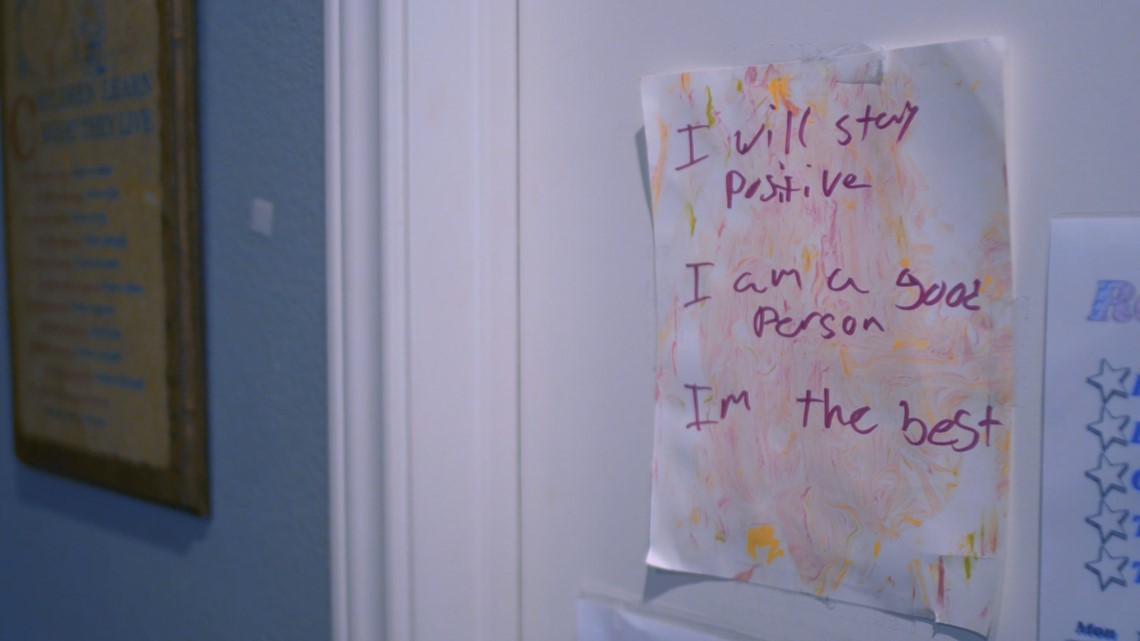
While Bob's House of Hope opened in 2021, Williams' first program geared toward a holistic approach to healing vulnerable victims of abuse launched in 2008 with Ranch Hands Rescue.
"I designed a program, with the help of professionals, to be able to partner abused and neglected animals with abused and neglected kids," Williams said.
Currently, Williams said the program partners with 28 agencies in the DFW Metroplex to serve more than 150 kids every week. 20% of the people who come to the ranch are veterans battling PTSD and female sex trafficking victims.
His experience and passion led Williams to serve on the human trafficking task forces for the Governor of Texas and the Texas Attorney General, in their respective offices.
During that time, he learned that there was a gap in information and resources concerning male sex trafficking victims. Williams made it his mission to address it.
"I totally underestimated the need," Williams said. "I had no idea how big it was. I can tell you it's an epidemic in our country right now."
Chapter 3 The Ugly Truth

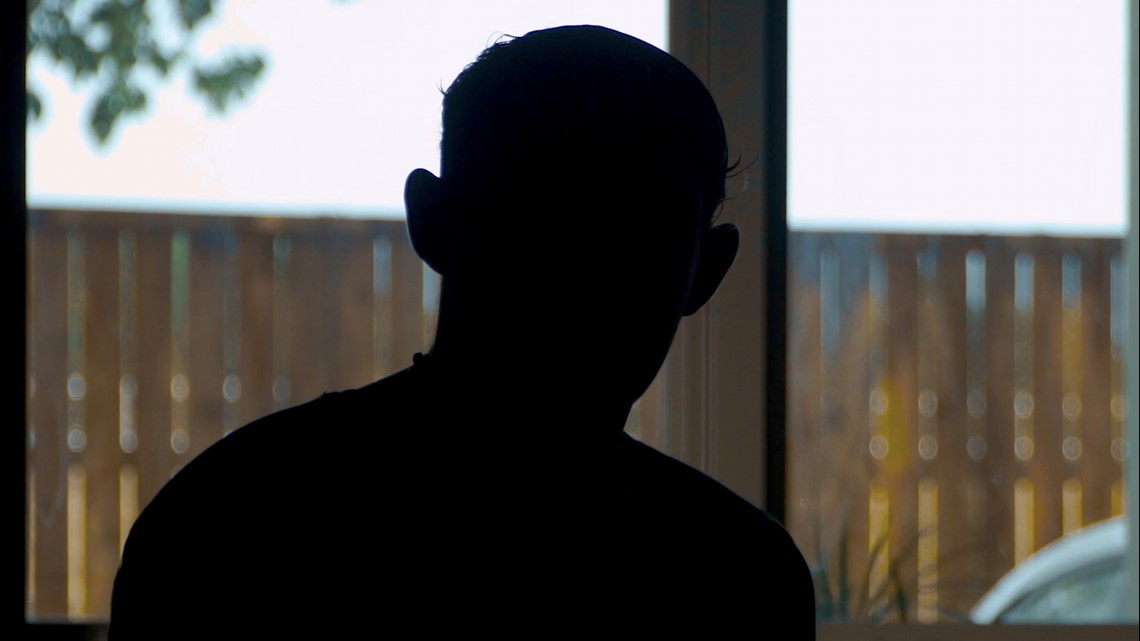
"I was adopted at the age of four," they said. "I was adopted into a not-so-loving family. We had six other children and I was the outcast."
They've been at Bob's House of Hope for almost a year.
"I was always the one that got in trouble, and they got tired of it," they said. "They put me on drugs at the age of nine."
The sex trafficking started a few years later.
"At the age of 12, they were actually the ones who sold me to my trafficker," they said.
The first time was after a concert. They said their foster father left them and another person came and picked them up.
“I started getting older, and it started happening more," they said. "I finally realized what was happening."
They went through school addicted to drugs and regularly suffered abuse. They said they would get in fights at school, and instead of digging into the root cause, school administrators opted to put them in classes for students with behavioral issues. When teachers would call home, they said their foster parents would lie.
"I didn’t want to tell anybody because I was embarrassed," they said. "I didn’t want to tell anybody because I was scared, too.”
They said they were in and out of the sex trafficking world until they were 19.
"Trap homes and being sexually abused in different ways and drugs everywhere," they said. "It’s just a hard life. Being homeless too."
Their breaking point came after a third drug overdose that landed them in a coma. Once they got out of the hospital, they called a friend who'd left them a phone number to call when they were ready to make a change. That friend connected them to Bob's House of Hope.
“They let me skip a whole line because I had nowhere else to go. I had no one to look to. I needed a way out. I needed help. They gave it to me," they said.
Dickeson said every victim they work with has a story like this one.
"When it starts that young, you don’t even realize how bad it is or how wrong it is or how much of an effect it had on you," Dickson said. "When you don’t have anyone to tell you that, you don’t even realize that you’re being victimized."
Dickeson gets calls from all around the country, usually from law enforcement after recovering a victim who needs immediate care.
"Literally every time, what they need is to move to a safer place and to receive medical care," Dickeson said.
However, the ignorance and negative stigma that surrounds these victims often create a barrier to resources.
Dickeson said he once served a young man who needed an exam from a sexual assault nurse examiner (SANE), often called a rape kit, but was turned away from a doctor who said they did not know how to perform the exam on a male. Another victim was refused care by a doctor who said their story didn't add up.
“Nobody is specialized in this. Nobody even thinks of this," Dickeson said. "They’re having to bend protocols and procedures and find new ways of doing things because it’s never even occurred to them that it could be a male being trafficked or a male being sexually abused. That’s just a completely foreign concept in a lot of cases, or they assume that it was intentional.”
Chapter 4 The Stigma

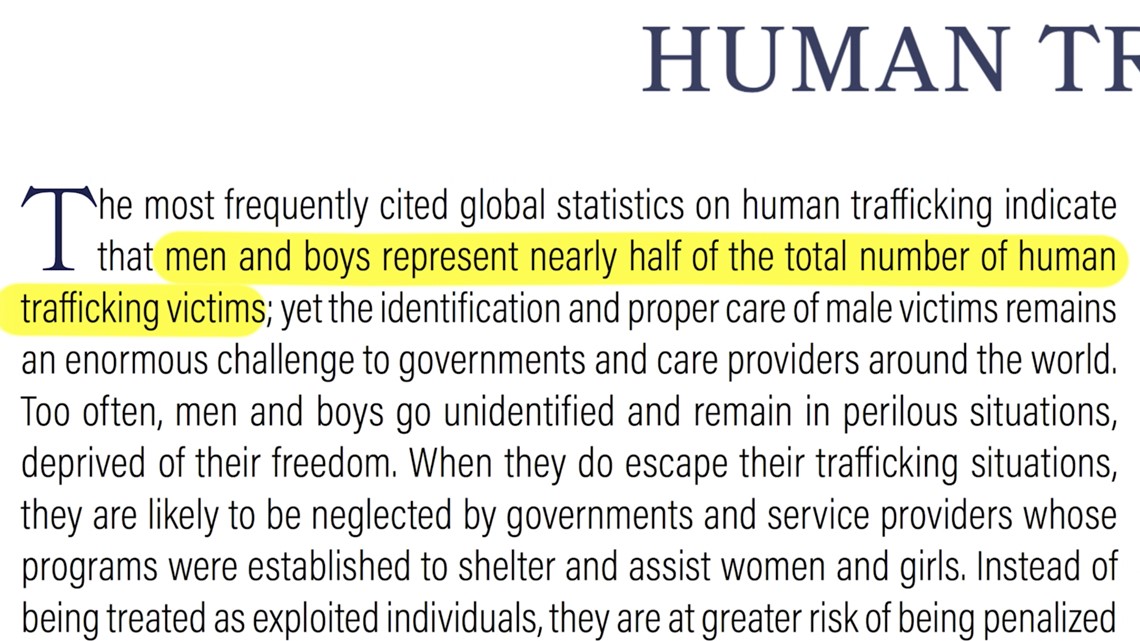
Male sex trafficking victims are often mislabeled as sexually promiscuous. Like with female victims, the crime is often hidden within the world of prostitution. Dickeson said male victims are often being sold by what appears to be an older male partner.
"The Romeo Scenario, which is kind of the code name for someone who is masquerading as a boyfriend but who is in fact trafficking them. Almost every single person we’ve interacted with has had that interaction at one point or another," Dickeson said. “We extracted a young man out of Arizona where it was his husband who was his trafficker.”
Dickeson said it's a cycle that's built on dependence, addiction and abuse.
The victim normalizes what's happening to them, depends on their abuser for drugs and shelter, and can even believe that what they're doing is their choice. Their means to an end.
“These are the experiences that they’re having," Dickeson said. "The details that are their daily life. This isn’t just a one-time thing. They were homeless and ended up in a rough spot so somebody exploited them. That happens and it’s horrific, but what also happens is it continues.”
Dickeson said homosexual males and transgender people are at an especially high risk of falling victim, but that the issue is not limited to any gender or sexuality.
"A lot of people think this is a strictly gay issue, and it's not," Dickeson said. "Homosexuality doesn't really play into it when it comes to abuse. It's about exploitation. It's about power. It's about money. It's about control. It's not really about sex."
Labels and stigma often minimize that the victims are, in fact, victims.
Traffickers tell their heterosexual victims that if they tell anyone what's happening to them, people will think they're gay.
Homosexual victims are made to feel that people will assume they "wanted" the abuse.
Chapter 5 Rebuilding Hope

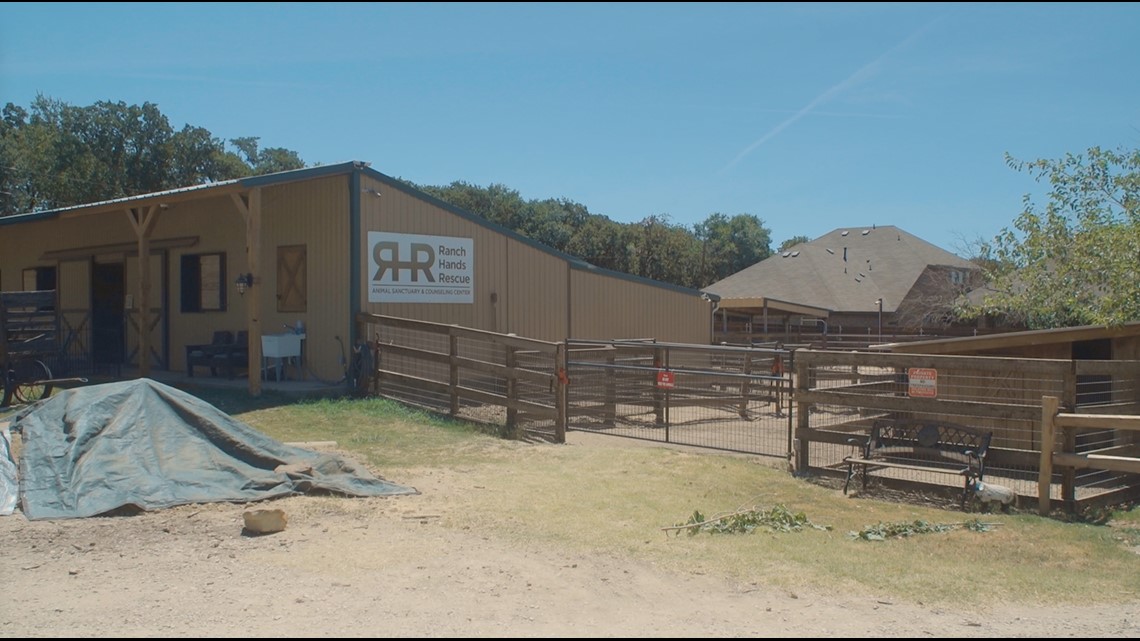
Mental Health Impact
By the time victims arrive at Bob's House of Hope, they've often been in and out of shelters, addiction rehab programs and mental health programs. Dickeson said, usually, "the root trauma has rarely been addressed."
“PTSD, anxiety, panic disorder, bipolar, schizophrenia and autism. You can’t combine all those things. That doesn’t make sense, but that’s what they come to us with," Dickeson said. "Nobody’s even asked. Nobody’s even explored that aspect of the trauma they’ve been through, and what you end up seeing then is a loss of hope.”
Their job is to rebuild that hope.
"We make sure they have night lights and weighted blankets and teddy bears and things like that to help bring that level of comfort and safety that they haven’t had before," Dickeson said. "We have to teach them basic life skills. Healthy eating. How to brush your teeth. How to comb your hair. We have some who won’t go in the shower without clothes on when they first come in.”
Trauma-informed counselors work with them daily to help them heal, rebuild and reclaim their freedom.
After just more than a year, they're seeing a breakthrough.
Hope
"I didn't want to admit that my parents didn't really love me for what I was worth, and I just didn't want to admit that I may have a problem that I don't know how to deal with," they said.
The second victim mentioned in this story, who sat down with WFAA, said they have been in school. Each month, they celebrate another monthly milestone of sobriety. They are passionate about photography.
They are reclaiming their life for themselves.
"I'm excited for my future and for when I get to the point in this program where I can be independent and that I can pay forward the love and the care and help another person out," they said.
Each of these stories is important.
Each success is a victory, but they don't come if the victims aren't seen and heard.
The hope is that more awareness will bring more breakthroughs.
Bob's House of Hope is currently displayed on billboards around the DFW Metroplex. Williams said they're preparing to expand so they can serve more people.
A mission that won't stop because it can't. Because it happens to boys, too.


